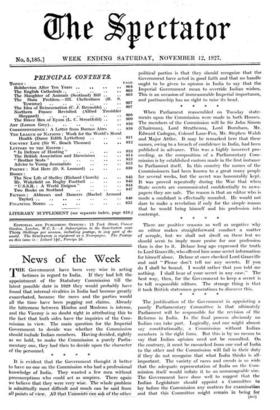The justification of. the Government in appointing a purely Parliamentary
Coininittee is that ultimately Parliament will be responsible for the revision of the Reforms in India. In the final pmcess obviously no Indian can take part. Logically, and one might almost say constitutionally, a Commission without Indian members is the right form. But this is by no means to say that Indian opinion need not be consulted. On the contrary, it must be ransacked from one-end of India to the other and the Commission will fail in their duty if they do not recognize that what India thinks is all- important. The variety of races and creeds is so wide that the adequate representation of India on the Com- mission itself would inflate it to an unmanageable size. The Government have done well to suggest that the Indian Legislature should' appoint a Committee to lay before the Commission any matters 'for examination and that this Committee :might remain in being for regular consultation with the Commission. Further than that, the Government propose that . the Provincial Legislatures should appoint similar Committees. When the Commission have presented their Report it will be referred to a Joint-Committee of both Houses of the Imperial Parliament, and to this Joint-Committee Indians will have the right to send delegations. The Government's scheme is really bilateral, though for the reasons we have given it is in form unilateral.
* * * *



































































 Previous page
Previous page